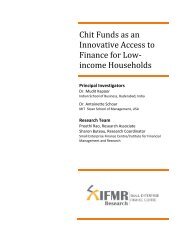Government of India Volume I: Analysis and Recommendations
Government of India Volume I: Analysis and Recommendations
Government of India Volume I: Analysis and Recommendations
Create successful ePaper yourself
Turn your PDF publications into a flip-book with our unique Google optimized e-Paper software.
PUBLIC DEBT MANAGEMENT<br />
fiscal consolidation an essential pre-condition” for creating such an agency. However,<br />
the Commission is <strong>of</strong> the view that such a pre-condition is not stated as a requisite in<br />
most <strong>of</strong> the expert committee reports that have recommended an independent public<br />
debt management agency, with the REPORT OF THE INTERNAL WORKING GROUP ON DEBT<br />
MANAGEMENT being a case in point.<br />
The Commission believes that the main benefit <strong>of</strong> an independent public debt management<br />
agency will come through the integration <strong>of</strong> public debt management functions<br />
<strong>and</strong> various databases <strong>and</strong> information, which are currently dispersed. By unifying the<br />
public debt management function, <strong>and</strong> efficiently linking it with the cash <strong>and</strong> the investment<br />
management functions, there will be improved information, analysis <strong>and</strong> thus decision<br />
making. With specialised human resources at its disposal, the public debt management<br />
agency can contribute to a more effective interface with the market resulting in<br />
cost-efficient management <strong>of</strong> <strong>Government</strong> borrowings. A specialised, unified <strong>and</strong> independent<br />
agency will have significant comparative advantage over the existing structure<br />
<strong>of</strong> a fractured <strong>and</strong> unco-ordinated <strong>Government</strong> borrowing programme spread across various<br />
agencies.<br />
The Commission’s views on public debt management <strong>and</strong> the creation <strong>of</strong> the public<br />
debt management agency draws significantly from the deliberations <strong>of</strong> the Working<br />
Group on Public Debt Management (see Annex 19.9).<br />
12.2. Structure <strong>of</strong> the public debt management agency<br />
The governance <strong>and</strong> operations <strong>of</strong> the public debt management agency would be h<strong>and</strong>led<br />
through a two-tiered arrangement. At the top, there would be an advisory council,<br />
comprising <strong>of</strong> experts in finance, law, <strong>and</strong> public debt management. The advisory council<br />
must advise <strong>and</strong> issue opinions on any matter related to the objectives <strong>and</strong> functions<br />
<strong>of</strong> the public debt management agency that is referred to it by the agency or the Central<br />
<strong>Government</strong>. It must also advise <strong>and</strong> provide its opinion on the financing plans submitted<br />
by the public debt management agency to the Central <strong>Government</strong>, as well as the<br />
agency’s annual report, whenever such opinion is sought. The council must meet periodically<br />
to review <strong>and</strong> ratify the borrowing programme for the upcoming months.<br />
The advisory council must issue its opinion by way <strong>of</strong> a consensus decision. Enforcing<br />
a consensus requirement is also a way <strong>of</strong> ensuring that there is co-ordination between<br />
the members <strong>of</strong> the council. Ideally, the chairperson <strong>of</strong> the council must be obliged to<br />
seek consensus from all members. When no consensus is possible, the council would resort<br />
to voting procedures. In such a scenario, opinions <strong>of</strong> individual dissenting members<br />
should be documented <strong>and</strong> placed on record. The functioning <strong>of</strong> the advisory council<br />
must follow st<strong>and</strong>ard governance practices as regards appointments, vacancies, meeting<br />
procedures, terms <strong>and</strong> conditions <strong>of</strong> appointment, resignation <strong>and</strong> future employment.<br />
As its title suggests, the advisory council would have no executive control over the<br />
day to day management <strong>of</strong> the public debt management agency. The supervision <strong>and</strong><br />
control over daily operations <strong>and</strong> management would vest in the h<strong>and</strong>s <strong>of</strong> a management<br />
committee within the public debt management agency. The composition <strong>of</strong> the<br />
management committee would be similar to that <strong>of</strong> the advisory council, except that advisory<br />
council members would be senior in rank to those <strong>of</strong> the management committee.<br />
This management committee must exercise general superintendence over, <strong>and</strong> manage<br />
the administration <strong>and</strong> business <strong>of</strong>, the public debt management agency. The rules<br />
<strong>and</strong> procedures followed by the committee must follow st<strong>and</strong>ard governance practices.<br />
The appointment <strong>of</strong> the chief executive <strong>of</strong> the public debt management agency should<br />
be open <strong>and</strong> transparent. The management committee should meet more frequently<br />
than the advisory council, <strong>and</strong> take operational decisions, which affect the daily affairs<br />
112 FINANCIAL SECTOR LEGISLATIVE REFORMS COMMISSION



